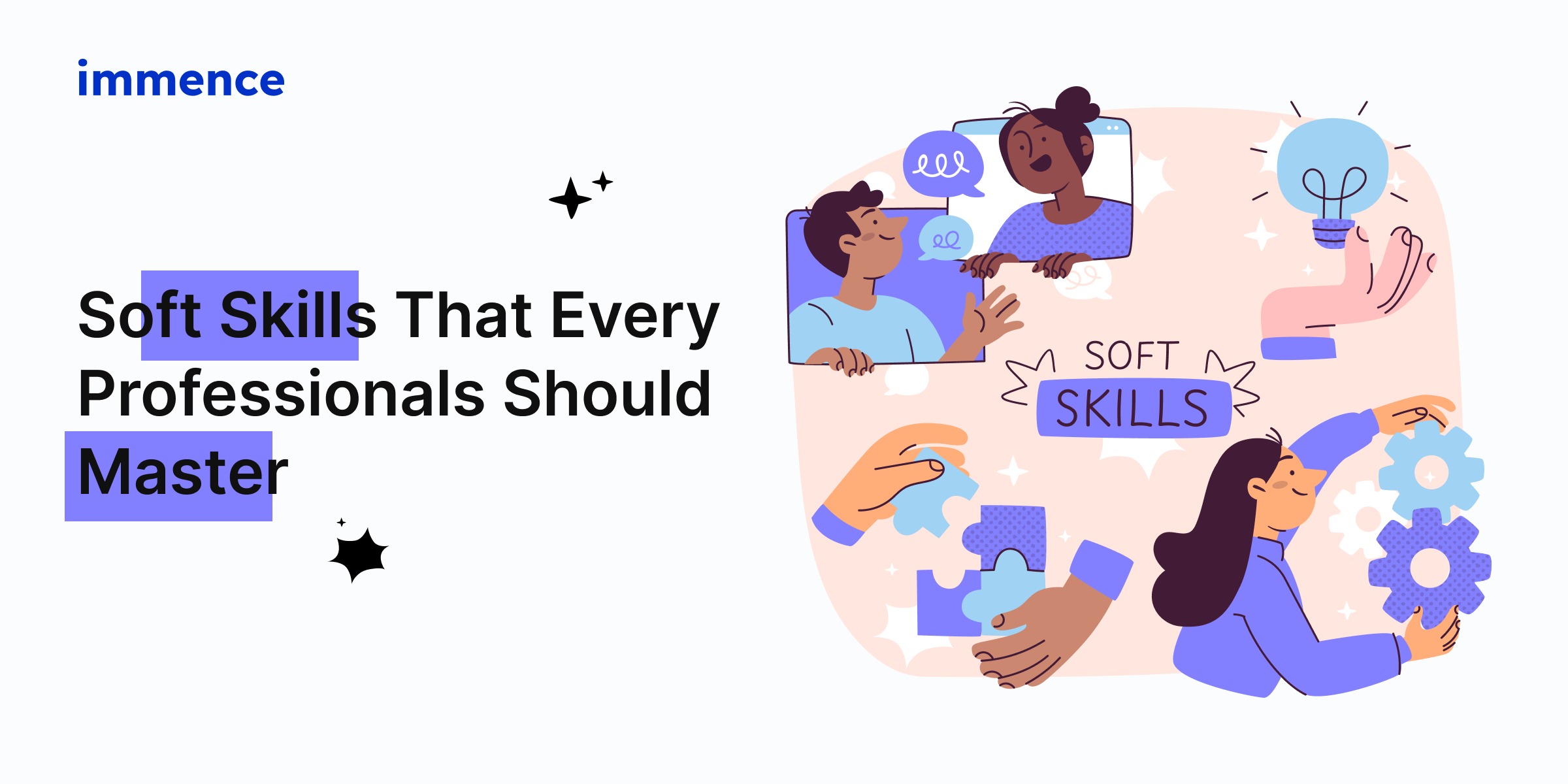Soft Skills That Every Professionals Should Master

‘Hard skills might get your foot in the door, but Soft skills are what you keep in the room’.
Combining people skills, social skills, communication skills, emotional intelligence, and traits that facilitate harmonious collaboration and interpersonal relationships is known as soft skills.
Imagine attending a meeting where one person’s ideas stand out not because they are the best, but rather because they communicate with confidence and clarity. This is the power of soft skills, which are crucial for success but are frequently undervalued. In a world where Automation and AI are dynamically changing entire industries, your interpersonal, emotional, and communication skills are what makes you stand out.
What are these essential skills, and why are they the most important tools in your professional toolbox?
Let’s get started!
1. Emotional Intelligence (EI): The ability to comprehend and being mindful about not only your own feelings but also those of people around you is known as emotional intelligence. It is essential for developing stronger bonds with others, making better decisions, and creating a peaceful workplace. The core of emotional intelligence is the ability to handle a conflict with empathy and fairness or to navigate through a high-stress situation without losing your cool. Simply put, EI starts with self-awareness, or knowing your feelings and how they affect your actions. This involves being mindful of your own feelings, realizing how they affect your actions, and being aware of your advantages and disadvantages.
For example, an emotionally intelligent person takes time to think things through and sees criticisms as a chance to improve rather than responding defensively. Another pillar is empathy, which is the ability to see things from other people's viewpoints. Small moments are another area where EI thrives. A small gesture like asking a coworker who is clearly sad how they're doing can make the workplace more welcoming and kind. When it comes to tackling complicated problems or simply demonstrating empathy in a brief conversation, emotional intelligence is the key to both personal and professional success.
2. Communication Skills: The capacity to communicate effectively is essential for any successful professional. Communication skills include attentive listening, clear thinking expression, and the use of suitable nonverbal clues such as emotion to reinforce information. Clear and concise communication ensures that your message is understood, minimizes misconceptions, and promotes workplace trust and collaboration. This includes the following:
- Verbal Communication: Speaking confidently and adapting your tone to your audience.
- Written Communication: Creating emails, reports, policy documents, presentations, meeting agendas, or proposals that are clear, structured, and error-free.
- Nonverbal communication is using body language, eye contact, and gestures to support your speech.
Suppose you're submitting an entirely new project proposal to your team. A well-spoken introduction establishes the tone, while visuals such as slides or charts help simplify complex concepts. Throughout the discussion, you actively listen to feedback, maintaining eye contact to indicate your interest and replying meaningfully to inquiries. This not only effectively communicates your ideas, but also promotes a collaborative environment in which others feel appreciated.
3. Adaptability: Adaptability refers to your ability to embrace change, develop new skills, and thrive in unpredictable conditions. It is about remaining adaptable when faced with problems and being open to new ideas or ways. In today's rapidly changing workplace, when new technology, shifting market trends, and unanticipated shocks are the norm, adaptation guarantees that you remain relevant and resilient.
Suppose you've been using a particular project management system for years, and your organization decides to switch to a new one. While some colleagues struggle with the change, you take the initiative to understand the new system, ask questions, and even assist your colleagues in getting up to speed. This proactive attitude not only demonstrates your adaptability, but also positions you as a dependable and resourceful team member.
4. Active Listening: One essential soft skill that helps professionals fully understand the message being conveyed is active listening. Active listening demands complete mental and emotional engagement with the speaker, as opposed to passive listening, which merely involves hearing words. This requires not just hearing what is being said but also comprehending the underlying feelings, viewpoints, and intentions.
In the workplace, active listening promotes deeper connections, lowers miscommunications, and increases trust. It involves giving attention to the speaker, seeking clarification, and providing appropriate feedback to ensure comprehension. Active listening professionals foster an atmosphere where people are valued and treated with respect.
For instance, a customer named James approached a retail store manager, Maria, with frustration about a defective product. Instead of interrupting or jumping to conclusions, Maria gave James her full attention, maintained eye contact, and nodded to show she was actively engaged. She paraphrased his concerns, saying, "So, the product didn’t work as expected, and it caused inconvenience—did I get that right?"
After understanding the issue, Maria calmly explained the return policy and offered an immediate replacement. James left satisfied, appreciating how she truly listened to his concerns. This demonstrates how active listening builds trust, resolves issues effectively, and enhances customer satisfaction.
5. Teamwork and Collaboration: In any profession, the ability to work as a team is essential. Most tasks in today's connected and fast-paced world demand teamwork. Professionals with strong teamwork and collaboration skills may work effectively with a variety of groups, recognizing each group's unique strengths and limitations and utilizing that information to achieve success. Instead of concentrating on their individual accomplishments, they are willing to contribute to the team's objectives and exhibit empathy, communication, and adaptability.
In order to be a good team player, one must acknowledge that each person contributes something special and that it's critical to create an atmosphere where everyone's opinions are valued. Open communication, respect for one another, and a desire to help others reach shared objectives are necessary for collaboration.
During a tight deadline for a client presentation, Maria, a sales associate, collaborated with her marketing, design, and finance colleagues. Maria focused on creating compelling content while the marketing team handled branding, the design team created visuals, and finance provided data insights. By holding regular check-ins and ensuring everyone understood their roles, Maria ensured seamless integration of each team's contributions. The client was impressed with the cohesive presentation, which led to closing the deal. This example highlights how teamwork and effective collaboration drive success.
6. Work Ethic: A strong work ethic is an essential soft skill that shows a professional's commitment to quality, dependability, and dedication. It involves more than just finishing tasks, it includes constant effort to produce excellent results, staying accountable, and acting honorably in all professional undertakings. Proactive, self-motivated, and disciplined, people with a high work ethic frequently go above and beyond the call of duty to satisfy their obligations. They are trustworthy team players who offer a good example for others and help the organization succeed.
Imagine an employee named Sarah who works as a project coordinator. Her manager assigned her a critical task to prepare the team's presentation for a major client meeting scheduled for Monday. On Friday afternoon, Sarah realized that the presentation required additional data analysis to strengthen the arguments. Despite it being the weekend, Sarah prioritized her work and dedicated extra time to ensure the presentation was polished and ready before the meeting.
Her commitment, willingness to go the extra mile, and ability to meet deadlines demonstrated her strong work ethic. The presentation impressed the client, leading to a successful deal. This showcases work ethics in action, where reliability, accountability, and dedication drive professional success and build trust within a team.
7. Time Management: Effective time management is a critical ability in today's job. The ability to effectively prioritize and manage time is essential for preserving productivity and lowering stress levels as more and more duties, meetings, and projects seek attention. Professionals who excel in time management can accomplish their goals, meet deadlines, and balance several duties without feeling overburdened.
Setting clear goals, efficiently planning and managing one's time, and utilizing tools or strategies like scheduling and prioritization are all part of time management. Professionals who possess this ability can determine what should be completed first and what can wait or be assigned to others. They are able to spot time wasters and concentrate on tasks that yield the biggest returns.
Suppose you have multiple meetings, emails to reply to, and a report that needs to be finished by the end of the day. Every activity may be finished effectively if you use time management strategies including making a to-do list, scheduling time for particular tasks, and setting clear priorities. You attend meetings with complete attention, complete the report on time, and yet find time to reply to critical emails. Not only can having good time management skills increase your own productivity, but it also makes you respected by your coworkers for being dependable and well-organized.
8. Problem Solving: One essential soft skill that helps professionals navigate difficulties and overcome barriers is problem solving. In the workplace, problems arise frequently whether it’s a technical glitch, a client complaint, or a lack of resources. It is extremely beneficial to be able to address these problems with a clear, logical, and creative mindset. Finding the true cause of a problem, researching potential fixes, assessing the advantages and disadvantages, and acting promptly to address it are all parts of problem-solving. Professionals with strong problem-solving abilities may stay productive even in challenging situations, ensure projects stay on track, and avoid unnecessary delays. It also involves working with others to identify the best answer and being open to changing and thinking creatively.
Suppose you're working on a software project and find that the program is running slower than normal. It may be tempting to solve the problem fast by making minor adjustments. Instead of simply just tackling the immediate problem, you take a step back to investigate the root cause. You recognize that the way the system handles data may generate larger problems in the future. Rather than merely addressing the current slowdown, you choose to make a more lasting improvement to boost the system's performance. This technique tackles the problem today while preventing larger problems in the future, demonstrating how prioritizing long-term solutions can be more beneficial than short-term solutions.
Conclusion
The unsung heroes of professional success are soft skills. They improve your capacity to interact, work together, and make a significant contribution, which makes you a valuable asset to any team. Soft skills, which bridge the gap between knowledge and its efficient application, are ageless even while technological skills continue to grow. So whether you’re just starting your career or looking to grow further, remember soft skills aren’t just an add-on they are the secret sauce to your professional success.
Want to make these skills your strength? Join us and let’s grow together! 🚀
Previous Article
Top Software Development Company in Education for 2024

